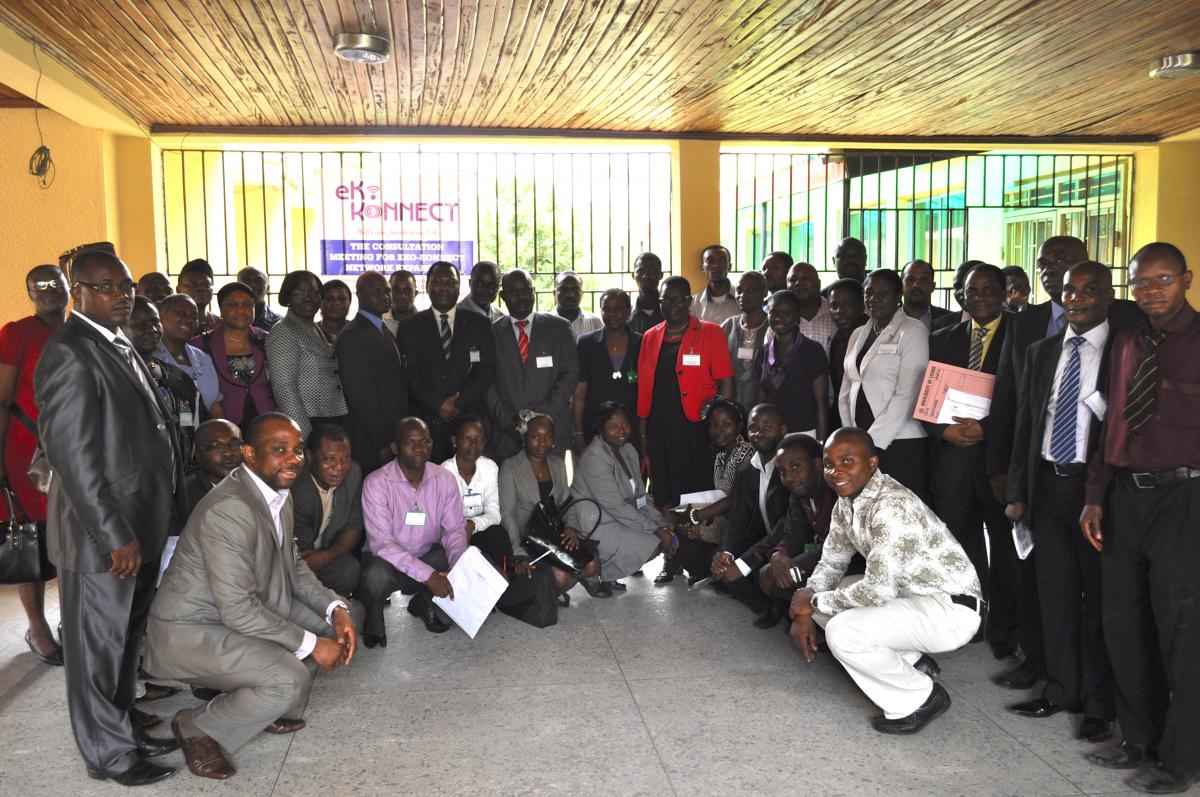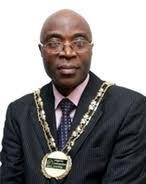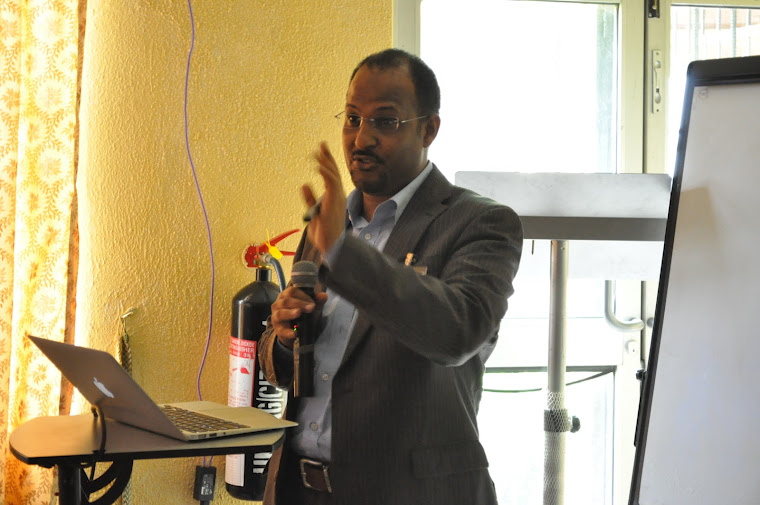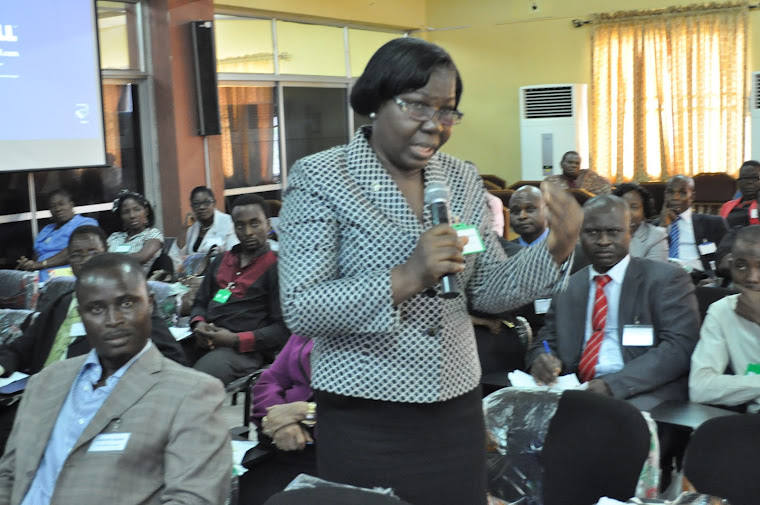The first Eko-Konnect stakeholders meeting since the pilot rollout was held at the Center for Information Systems and Technology, University of Lagos on March 15th 2012. Sixty principal officers, librarians and IT heads from 22 institutions and organizations met to review the progress of the association and deliberate on the next phase of linking all its members.
 Prof. Charles Uwadia, Chair of the Eko-Konnect board of trustees welcomed the participants on behalf of the Vice-chancellor who had a conflicting appointment and could not attend. He set the stage with an overview of Eko-Konnect. He said its formation was triggered by the establishment of the Internet Exchange Point in Lagos in 2007 and the landing of international sea cables which made Internet bandwidth available at much less cost.
Prof. Charles Uwadia, Chair of the Eko-Konnect board of trustees welcomed the participants on behalf of the Vice-chancellor who had a conflicting appointment and could not attend. He set the stage with an overview of Eko-Konnect. He said its formation was triggered by the establishment of the Internet Exchange Point in Lagos in 2007 and the landing of international sea cables which made Internet bandwidth available at much less cost.
With the support of the Internet Exchange Point of Nigeria and Datasphir, institutions in the Lagos area met in December 2009 and resolved to interconnect in a collaborative network to provide a common front to service providers and in this way establish education networking in the developing telecoms environment.
Eko-Konnect subsequently got launched with a remit to build capacity to support campus networks, interconnect them and link to neighbours in ngREN and WACREN.
The first Eko-Konnect stakeholders meeting since the pilot rollout was held at the Center for Information Systems and Technology, University of Lagos on March 15th 2012. Sixty principal officers, librarians and IT heads from 22 institutions and organizations met to review the progress of the association and deliberate on the next phase of linking all its members.
 Prof. Charles Uwadia, Chair of the Eko-Konnect board of trustees welcomed the participants on behalf of the Vice-chancellor who had a conflicting appointment and could not attend. He set the stage with an overview of Eko-Konnect. He said its formation was triggered by the establishment of the Internet Exchange Point in Lagos in 2007 and the landing of international sea cables which made Internet bandwidth available at much less cost.
Prof. Charles Uwadia, Chair of the Eko-Konnect board of trustees welcomed the participants on behalf of the Vice-chancellor who had a conflicting appointment and could not attend. He set the stage with an overview of Eko-Konnect. He said its formation was triggered by the establishment of the Internet Exchange Point in Lagos in 2007 and the landing of international sea cables which made Internet bandwidth available at much less cost.
With the support of the Internet Exchange Point of Nigeria and Datasphir, institutions in the Lagos area met in December 2009 and resolved to interconnect in a collaborative network to provide a common front to service providers and in this way establish education networking in the developing telecoms environment.
Eko-Konnect subsequently got launched with a remit to build capacity to support campus networks, interconnect them and link to neighbours in ngREN and WACREN.
Major activities in Eko-Konnect since it’s launch;
- The Carenet-WACREN project to develop a template for building research and education networks with open source tools.
- Registration of Eko-Konnect as a not for profit association
- Award of contract to connect a research collaboration videoconferencing link from Lagos to Jos from STEP-B assisted Centre of Excellence in Multimedia & Cinematography.
- Support of another member of the community, Federal College of Education (Technical) Akoka in the deployment of a solar powered wireless campus LAN.

Other impending capacity building activities include training on internet resources and IPv6 in collaboration with Afrinic, the internet registry for Africa, a workshop on the use of open software for virtual libraries and shared repositories, and a bootcamp in network administration and security.
Prof. Uwadia tasked the delegates to provide a roadmap for the consolidation and expansion of the Eko-Konnect network as they had done with its setup. He urged members to assume more responsibility as Eko-Konnect grows, that active participation by the community would make Eko-Konnect a transparent and progressive organization.
Mr Omo Oaiya, Chair of the WACREN committee on connectivity and Infrastructure presented and described Eko-Konnect as an NREN building block whose design and templates were developed in Carenet-WACREN. He said this was the Eko-Konnect blueprint and the documents were available for download from the project site. He cited the emergence of SokREN as an example of their usefulness and said the next step was to link these two clusters and connect the communities in wider collaboration. As organised user groups, clusters like Eko-Konnect and SokREN not only get better network links when they collaborate, they are also able to partner in strategic relationships with service providers for long term sustainability.
Mr Cletus Okolie, NOC manager gave an overview of the interaction between the Nigerian and Swedish teams in the rollout of the pilot network describing the activities that had gone into its design and deployment and how they could be replicated to build capacity. He spoke of the development of Eko-Geeks, a student community established using similar principles and how they communicate on the network, meet in intern training workshops and annually as a group when they celebrate software freedom.
DNS management, Video-conferencing IP telephony, e-mail filtering and network monitoring were listed as services available from the NOC with ongoing trials of Eduroam, a secure wireless technology that would allow Eko-Konnect members to securely log in using the same details as their local environment. He said there were high expectations from the training workshop with Afrinic, that as a new network, it made sense for Eko-Konnect to be conversant with the latest technology and deploy IPv6 as well as the older IPv4.

Mr Muhammed Rudman, CEO of the IXPN said the exchange was also a non-profit dedicated to ensuring faster access by providing a neutral environment for the exchange of local traffic and cached content. He spoke of the Abuja exchange and ongoing efforts to establish more so clusters could link each other at lower costs by connecting to the nearest exchange. After chronicling the role of higher education in the development of the internet, he reminisced about connecting Unilag to the internet exchange and the successes since then. He advised that the delegates must not be passive about the development of RENs and challenged them to play similar roles in Nigeria
Prof. Ralph Akinfeleye, HOD Mass Communication Unilag and Team Leader, Center of Excellence in Multimedia and Cinematography dropped in after lunch to share his connection to Eko-Konnect. He discussed the Center’s objectives and it’s progress stating that the link to partners in Jos was to support video conferencing and sharing of content such as captured lectures.

The media communications professor noted that Eko-Konnect efforts to link all member institutions presented more partnership opportunities and said he looked forward to their participation in the Centers research activities. The human networking benefit of clusters was also realised on conclusion of Prof. Akinfeleye’s presentation when former associates amongst the delegates who had not seen him for a while used the opportunity to thank the Professor for his contributions to mass communication education in the country.
After extensive discussion on the way forward, the delegates agreed to form three working groups based on Eko-Konnect needs and the functions of the delegates in their respective institutions. The working groups and nominated leaders.
Strategy and Governance – Prof. Omolara Bambgoye, Deputy Vice Chancellor, Lagos State University
Content and Applications – Mrs Olayinka Adebowale, Librarian, Yaba College of Technology
Networking and Systems – Mr Olutayo Okulaja, IT Head, Lagos State Polytechnic

The members of the working groups charged themselves with the task of establishing a plan for long-term management of the association and network development.
With a vote of thanks to the delegates, Eko-Konnect partners and STEP-B for their support of the various initiatives, Mrs Bambgoye formally closed the meeting with a prayer.
